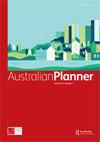Beyond engagement theatre: challenging institutional constraints of participatory planning practice
IF 1.2
Q2 Social Sciences
引用次数: 19
Abstract
ABSTRACT Institutional realities often limit participatory planning practice from reaching its full potential. Rather than continuing to improve participatory approaches and methods in isolation, we studied whether there is merit in extending the repertoire of planning knowledge and skills to encompass a focus on the broader institutional decision-making processes. By interviewing a diverse range of experts working in the Queensland planning context, the research sought to understand different types of clashes between participatory planning practices and institutional cultures. Interviewees shared their personal experiences and strategies that helped them traverse institutional processes and constraints. This confirmed that there is already a wealth of tacitly held skills, which have not yet been formalised. Our data analysis found that planning practice may be improved by attenuating the disparity between external messaging and internal practices, and by enabling planning practitioners to better utilise informal institutional structures. Intermediation is proposed as a skillset to formalise planners’ tacitly held interpersonal and political literacy and acumen, and equip them to better navigate and negotiate institutional structures and constraints.超越参与剧场:挑战参与式规划实践的制度约束
制度现实往往限制参与式规划实践发挥其全部潜力。我们没有孤立地继续改进参与性方针和方法,而是研究了是否有必要扩大规划知识和技能的范围,将重点放在更广泛的机构决策过程上。通过采访在昆士兰州规划环境中工作的各种专家,该研究试图了解参与式规划实践与制度文化之间不同类型的冲突。受访者分享了他们的个人经验和策略,这些经验和策略帮助他们克服了制度流程和制约因素。这证实了已经存在大量的隐性技能,这些技能尚未正式形成。我们的数据分析发现,规划实践可以通过减少外部信息和内部实践之间的差异,以及通过使规划从业者更好地利用非正式的制度结构来改进。中介被提议作为一种技能组合,使规划者们心照不生的人际关系和政治素养和智慧正式化,并使他们能够更好地驾驭和谈判制度结构和约束。
本文章由计算机程序翻译,如有差异,请以英文原文为准。
求助全文
约1分钟内获得全文
求助全文

 求助内容:
求助内容: 应助结果提醒方式:
应助结果提醒方式:


